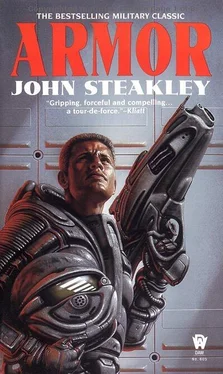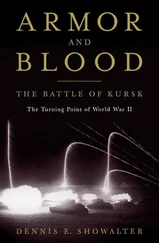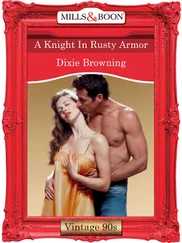It stood three meters tall and weighed, on average, four times more than a human being—damn near as much as a suited warrior. It had six limbs, two for walking upright and erect, four for work. The upper limbs, call them arms, were incredibly massive, hanging down one and a half meters from two titanic shoulder joints. The arms ended in huge, hulking, two-pronged claws twice the size of an armored human fist. The middle arms were smaller, approximately human size. Curved, two-pronged pincers here for delicate work. The legs were the size of tree trunks, ending with semicircular pads splayed flat to the ground. There were two knarled knobs on each. Each limb, upper, middle, and lower, had three joints.
The body had three sections: shoulder, abdomen, pelvis. Each was covered with coarse, hairlike fibers spaced widely apart.
The head, half again larger than a warrior’s helmet, bore a dull globular eye on each side. The mandible-mouth opened in three vertical sections of varying width and shape. Closed, it resembled nothing so much as a smooth-sheened, toothless, human skull. The skin was not skin at all, but bone. Ectoskeleton. The muscles were inside. It was awesomely powerful.
It was the Enemy.
It was an ant.
It was called something else, something long and technical and dreamed up out of range. But scientific jargon had nothing to do with what men had felt when they saw it move, saw it coming. It didn’t matter that it had no antennae and walked upright and was too, too, damn big. From the beginning, men had called it an ant.
Felix saw no reason to change that. He stood watching the holo of the enemy in the wall of the passage leading from the Briefing Room. The others had long since filed past. They used their last minutes before drop as a time to be with friends or check equipment or fight panic or yield to it and vomit or to pray with undreamed-of piety.
Felix, alone, watched the ant.
The screen on the back wall of Drop Bay Four was purely representational. It served no actual purpose in the mechanics of Transit. It merely informed the dropping parties of the various stages. First it would glow white: Attention. Next would come yellow: Transit beginning. Then the yellow would be interspersed with flashing bands of red light: thirty seconds. As the ten second mark arrived, the red bands flashed the countdown. They would turn slowly inward across the surface of the wall until a square had formed. The square would shrink, coalesce, brightly pulsing all the while. If all was well, the red square would turn bright green at the two second mark and the drop party would step quickly forward toward it.
Actually, they were trained to all but throw themselves toward the green square. “Try to bust that wall!” the Drill-masters had demanded. And they would try, surging forward en masse. But they never actually touched the screen, never even left their drop squares. Instead, they would Transit. To the next room, to another Drop Bay, to another ship. To another world.
The presence of Banshee loomed uncomfortably as Felix entered Drop Bay Four and stepped through the others to the scout position at the very front of the formation. As he took his place, he appreciated at last the decision not to forewarn him of scout duty. One could do anything at all for a warrior’s supposed sense of confidence—show him his high test scores, pat him on the back, tell him he was superhuman. None of it would affect in the slightest the growing sense of desperation that began the instant he realized he was going to be the very first of the bunch to touch down on alien soil. Given a few days’ notice, the candidate would be, at the very least, hallucinating by drop time. Given a week, a basket case. Given two weeks—nobody would show up.
By springing the assignment on the morning of the drop, there was, presumably, too little time for such paranoia to develop.
Enough time for me, thought Felix sourly.
But only a small part of him thought anything at all. The rest of Felix thought nothing. The rest of Felix was psyching, psyching. Becoming the Engine.
For no amount of reassurance, no amount of technical data, or surveillance figures or probability curves or anything else—however thorough—had convinced him that he would not be slaughtered a split-second after Transit. And if they were to try for another year, the result would be just the same. Nothing they could say would make the slightest difference to him. For they, They, stayed put. They computed. They theorized. They were pleased at Their brilliance or stunned by Their failure. Perhaps even guilt-ridden at the result.
But from the ship.
Psyching… psyching….
Dimly, he had been horrorstruck by his fellow warriors’ attitudes. Some had actually complained at being left out of the “big show.” None of them, it seemed, felt as he did. They stood about talking, gesturing, laughing. A slight hint of nervousness, of course, but that was damn well not enough.
Are they insane? he wondered. They actually have faith in fools who would throw us into armed combat—by the thousands —after less than a year of training? Madness, he thought. But, again, only a small bit of him thought anything at all.
Psyching… psyching….
The wall, formerly a bland shade of confident blue, turned suddenly white. The hundred regulars assumed formation behind him.
“Attention,” said the CO unnecessarily. His voice sounded deliberately bored.
Psyching… psyching….
Yellow light appeared at the edges of the screen. It flowed smoothly toward the center in what the psychs had called “color comfort pattern.”
“Look alive,” said the CO. Someone coughed directly into his microphone. There were several nervous titters. “Shut up, there,” said the CO.
Psyching… psyching….
Red bands began their pulsing march across the screen.
“Good luck, ladies and gentlemen,” purred the even-toned voice of the Transit Control Officer.
“Go get ’em!” urged someone else in the booth.
“Don’t worry,” assured a warrior, a fierce female voice.
“Shaddup!” growled the CO with a nervous edge to his tone.
Psyching… psyching….
As the red squared formed and pulsed, Felix, against all orders and procedures, reached behind his back and disengaged his rifle. He held it in front of him at the ready, safety off. Someone cleared a throat to speak, possibly to object, to chew him out, to….
But it was too late. The red square flashed to green and all were moving forward and there was loud breathing from some and no breathing at all from most and stunned shock from the inhabitants of the Transit Control Booth when they saw that the lead man, the scout, had goddamn near hit the far wall and…
…and ANTS! ANTS EVERYWHERE!
Felix fired and fired, the blue beam slicing through the ectoskeleton like it was butter and long stiff tentacles slammed into his faceplate as he collided with their hurtling bodies and he tripped on one, still firing, and felt himself fall and, in a desperate lunge to remain upright, brought a plassteel leg forward with such brutal speed that the toe of his boot tore completely through the stumbling ant’s midsection. Black fluid spouted but Felix was already gone. …
Slamming forward into them, firing wildly about, he had to get, to get out of them, had to, had-to… Mandibles flashing by him and at him, tree-trunk arms and legs and claws crossing in front of him…. Most didn’t seem to know he was there and the few who saw and reacted were blazed down or passed by but still there were more to come and more still, rows and rows of them, he’d been dropped right into them and the overworked blazer was signaling frantically of overheating that he swore he felt right through the goddamned plassteel and still there were more—he must keep moving, he must and then—
Читать дальше











